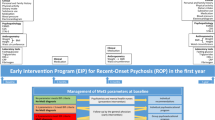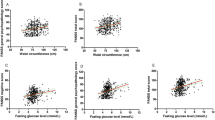Abstract
Purpose
Patients with severe mental illness are at high risk for metabolic and cardiac disorders. Thus, monitoring of cardiovascular risks is imperative and schedules for screening for lipids, glucose, body mass index (BMI), waist-hip ratio and blood pressure have been developed. We intended to analyze screening for metabolic disorders in German patients with schizophrenia spectrum disorders in routine psychiatric care.
Methods
We included 674 patients with any F2 diagnosis in out- and inpatient settings and analyzed metabolic screening procedures as practiced under conditions of usual care.
Results
Except BMI (54 %), all other values were documented only in a minority of patients: waist circumference (23 %), cholesterol (28 %), fasting glucose (19 %), triglycerides (25 %) and blood pressure (37 %). We found evidence for less than perfect quality of blood pressure measures. The group of patients who met the individual metabolic syndrome ATP III criteria was comparable to the US CATIE trial.
Conclusions
We conclude that frequency and quality of metabolic monitoring in German in- and outpatients settings are not in accordance with the respective recommendations. Similar to previous reports we found evidence for a high prevalence of metabolic disturbances in German patients with schizophrenia spectrum disorders.
Similar content being viewed by others
References
Osby U, Correia N, Brandt L, Ekbom A, Sparén P (2000) Mortality and causes of death in schizophrenia in Stockholm county, Sweden. Schizophr Res 45:21–28
Wegelius A, Tuulio-Henriksson A, Pankakoski M, Haukka J, Lehto U, Paunio T et al (2011) An association between high birth weight and schizophrenia in a Finnish schizophrenia family study sample. Psychiatry Res 190:181–186
Alkelai A, Greenbaum L, Lupoli S, Kohn Y, Sarner-Kanyas K, Ben-Asher E et al (2012) Association of the type 2 diabetes mellitus susceptibility gene, TCF7L2, with schizophrenia in an Arab-Israeli family sample. PLoS One 7:e29228. doi:10.1371/journal.pone.0029228
Fernandez-Egea E, Miller B, Bernardo M, Donner T, Kirkpatrick B (2008) Parental history of type 2 diabetes in patients with nonaffective psychosis. Schizophr Res 98:302–306
Mukherjee S, Schnur DB, Reddy R (1989) Family history of type 2 diabetes in schizophrenic patients. Lancet 1:495
Chwastiak LA, Rosenheck RA, Kazis LE (2011) Association of psychiatric illness and obesity, physical inactivity, and smoking among a national sample of veterans. Psychosomatics 52:230–236
Gupta A, Craig TK (2009) Diet, smoking and cardiovascular risk in schizophrenia in high and low care supported housing. Epidemiol Psichiatr Soc 18:200–207
Brown S, Birtwistle J, Roe L, Thompson C (1999) The unhealthy lifestyle of people with schizophrenia. Psychol Med 29:697–701
Vancampfort D, Probst M, de Herdt A, Corredeira RM, Carraro A, de Wachter D, de Hert M (2013) An impaired health related muscular fitness contributes to a reduced walking capacity in patients with schizophrenia: a cross-sectional study. BMC Psychiatry 13:5. doi:10.1186/1471-244X-13-5
Laursen TM, Munk-Olsen T, Vestergaard M (2012) Life expectancy and cardiovascular mortality in persons with schizophrenia. Curr Opin Psychiatry 25:83–88
Brown S, Mitchell C (2012) Predictors of death from natural causes in schizophrenia: 10-year follow-up of a community cohort. Soc Psychiatry Psychiatr Epidemiol 47:843–847
Allison DB, Mentore JL, Heo M, Chandler LP, Cappelleri JC, Infante MC et al (1999) Antipsychotic-induced weight gain: a comprehensive research synthesis. Am J Psychiatry 156:1686–1696
Smith M, Hopkins D, Peveler RC, Holt RI, Woodward M, Ismail K (2008) First- v. second-generation antipsychotics and risk for diabetes in schizophrenia: systematic review and meta-analysis. Br J Psychiatry 192:406–411
Chaggar PS, Shaw SM, Williams SG (2011) Effect of antipsychotic medications on glucose and lipid levels. J Clin Psychiatry 51:631–638
Falissard B, Mauri M, Shaw K, Wetterling T, Doble A, Giudicelli A, de Hert M (2011) The METEOR study: frequency of metabolic disorders in patients with schizophrenia. Focus on first and second generation and level of risk of antipsychotic drugs. Int Clin Psychopharmacol 26:291–302
Newcomer JW (2007) Metabolic considerations in the use of antipsychotic medications: a review of recent evidence. J Clin Psychiatry 68(Suppl 1):20–27
Stahl SM, Mignon L, Meyer JM (2009) Which comes first: atypical antipsychotic treatment or cardiometabolic risks? Acta Psychiatr Scand 119:171–179
Rummel-Kluge C, Komossa K, Schwarz S, Hunger H, Schmid F, Lobos CA, Kissling W, Davis JM, Leucht S (2010) Head-to-head comparisons of metabolic side effects of second generation antipsychotics in the treatment of schizophrenia: a systematic review and meta-analysis. Schizophr Res 123:225–233
Oud MJ, Meyboom-de Jong B (2009) Somatic diseases in patients with schizophrenia in general practice: their prevalence and health care. BMC Fam Pract 10:32
Morrato EH, Cuffel B, Newcomer JW, Lombardo I, Kamat S, Barron J (2009) Metabolic risk status and second-generation antipsychotic drug selection: a retrospective study of commercially insured patients. J Clin Psychopharmacol 29:26–32
Morrato EH, Druss B, Hartung DM, Valuck RJ, Allen R, Campagna E, Newcomer JW (2010) Metabolic testng rates in 3 state Medicaid programs after FDA warnings and ADA/APA recommendations for second-generation antipsychotic drugs. Arch Gen Psychiatry 67:17–24
Nasrallah HA, Meyer JM, Goff DC, McEvoy JP, Davis SM, Stroup TS et al (2006) Low rates of treatment for hypertension, dyslipidemia and diabetes in schizophrenia: data from the CATIE schizophrenia trial sample at baseline. Schizophr Res 86:15–22
De Hert M, Vancampfort D, Correll CU, Mercken V, Peuskens J, Sweers K, van Winkel R, Mitchell AJ (2011) Guidelines for screening and monitoring of cardiometabolic risk in schizophrenia. Br J Psychiatry 199:99–105
American Diabetes Association, American Psychiatric Association, American Association of Clinical Endocrinologists, North American Association for the Study of Obesity (2004) Consensus development conference on antipsychotic drugs and obesity and diabetes. J Clin Psychiatry 65:267–272
De Hert M, Dekker JM, Wood D, Kahl KG, Holt RI, Möller HJ (2009) Cardiovascular disease and diabetes in people with severe mental illness position statement from the European Psychiatric Association (EPA), supported by the European Association for the Study of Diabetes (EASD) and the European Society of Cardiology (ESC). Eur Psychiatry 24:412–424
Mackin P, Bishop DR, Watkinson HM (2007) A prospective study of monitoring practices for metabolic disease in antipsychotic-treated community psychiatric patients. BMC Psychiatry 7:28
Buckley PF, Miller DD, Singer B, Arena J, Stirewalt EM (2005) Clinicians’ recognition of the metabolic adverse effects of antipsychotic medications. Schizophr Res 79:281–288
Haupt DW, Rosenblatt LC, Kim E, Baker RA, Whitehead R, Newcomer JW (2009) Prevalence and predictors of lipid and glucose monitoring in commercially insured patients treated with second-generation antipsychotic agents. Am J Psychiatry 166:345–353
Newcomer JW, Nasrallah HA, Loebel AD (2004) The atypical antipsychotic therapy and metabolic issues National Survey: practice patterns and knowledge of psychiatrists. J Clin Psychopharmacol 24(Suppl 1):1–6
Mitchell AJ, Delaffon V, Vancampfort D, Correll CU, de Hert M (2012) Guideline concordant monitoring of metabolic risk in people treated with antipsychotic medication: systematic review and meta-analysis of screening practices. Psychol Med 42:125–147
Deuschle M, Bergemann N, Kammerer-Ciernioch J, Franz M, Lautenschlager M, Lederbogen F et al (2008) Clinical analyses of the treatment of schizophrenia, CATS: Grundlagen einer pharmakoepidemiologischen Studie zur Qualität der Versorgung von Patienten mit Schizophrenie. Psychopharmakotherapie 15:147–152
Ford ES, Abbasi F, Reaven GM (2005) Prevalence of insulin resistance and the metabolic syndrome with alternative definitions of impaired fasting glucose. Atherosclerosis 181:143–148
Expert Committee on the Diagnosis and Classification of Diabetes Mellitus (2003) Report of the expert committee on the diagnosis and classification of diabetes mellitus. Diabetes Care 26(Suppl 1):5–20
McEvoy JP, Meyer JM, Goff DC, Nasrallah HA, Davis SM, Sullivan L et al (2005) Prevalence of the metabolic syndrome in patients with schizophrenia: baseline results from the clinical antipsychotic trials of intervention effectiveness (CATIE) schizophrenia trial and comparison with national estimates from NHANES III. Schizophr Res 80:19–32
Mitchell AJ, Vancampfort D, Sweers K, van Winkel R, Yu W, de Hert M (2011) Prevalence of metabolic syndrome an metabolic abnormalities in schizophrenia and related disorders—a systematic review and meta-analysis. Schizophr Bull. doi:10.1093/schbul/sbr148
Sicras-Mainar A, Blanca-Tamayo M, Rejas-Gutiérrez J, Navarro-Artieda R (2008) Metabolic syndrome in outpatients receiving antipsychotic therapy in routine clinical practice: a cross-sectional assessment of a primary health care database. Eur Psychiatry 23:100–108
Acknowledgments
This study was supported by Pfizer, Germany.
Conflict of interest
M. D. Advisory activity for Bristol Myers Squibb and Otsuka Pharma. Speaker fees from Bristol Myers Squibb, Otsuka and Lilly. Investigator in Roche and Lilly studies. F. P., M. B., J. K.-C., M. L., F. L., D. R.-E., M. W., J. R. No conflict of interest. N. B. Conferences: invitations as contributor for Bristol-Myers Squibb, Novartis, Otsuka, Pfizer, Servier. Sponsoring and grants by AstraZeneca, Bristol-Myers Squibb, GlaxoSmithKline, Janssen-Cilag, Lilly, Lundbeck, Novartis, Novo Nordisk, Otsuka, Pfizer, Sanofi-Aventis, Servier, Wyeth. Clinical trials: acting as principal investigator or co-investigator for AstraZeneca, Bristol-Myers Squibb, Desitin, Pfizer, Otsuka, and Servier; advisory activities for AstraZeneca, Bristol-Myers Squibb, Novartis, and Otsuka. M. F. Received speakers fees and sponsoring for symposia from Astra Zeneca, Norvatis, Lilly, Lundbeck, Janssen-Cilag, Pfizer, Servier, Bristol-Myers Squibb, GlaxoSmithKline. K. G. K. Received speaker honoraria by AstraZeneca, BMS, GSK, EliLilly, Janssen-Cilag, Otsuka, Pfizer. J. G., J. U. Staff of Pfizer Deutschland GmbH.
Author information
Authors and Affiliations
Corresponding author
Rights and permissions
About this article
Cite this article
Deuschle, M., Paul, F., Brosz, M. et al. Assessment of cardiovascular disease risk in patients with schizophrenia spectrum disorders in German psychiatric hospitals: results of the pharmacoepidemiologic CATS study. Soc Psychiatry Psychiatr Epidemiol 48, 1283–1288 (2013). https://doi.org/10.1007/s00127-013-0676-0
Received:
Accepted:
Published:
Issue Date:
DOI: https://doi.org/10.1007/s00127-013-0676-0




